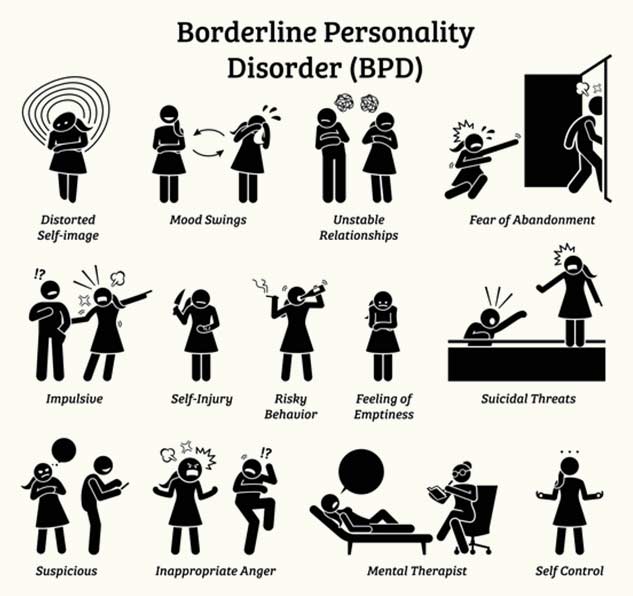
Borderline Personality Disorder (BPD) is one of the most misdiagnosed mental illnesses, generally defined by out-of-control emotions, unstable relationships, impulsive actions, and a tenuous sense of self. Although it is overwhelming at times, for the individual experiencing it and those who care about them, careful management and support can do wonders.
Table of Content:-
CHECK YOUR
MENTAL HEALTH

In an exclusive interaction with the editorial team of Onlymyhealth, Dr Vikram Vora, Medical Director and Chief Health Officer (Indian Subcontinent), International SOS, explained that through a proper mix of therapy, lifestyle modification, and comprehension, people with BPD can have satisfying, stable, and meaningful lives. Read ahead to know what he shared with us.
Understanding Borderline Personality Disorder
“Borderline Personality Disorder is a mental illness that influences the way an individual thinks and feels about himself/herself and other people. It usually starts during early adulthood and can be precipitated or exacerbated by childhood trauma, abuse, or troubled family relations,” he noted. BPD individuals can have intense mood shifts, fear abandonment, persistent feelings of emptiness, self-injurious behaviour, and trouble trusting others.
Also Read: What Is The ‘Sandwich Method’ In Skincare? Here’s How It Helps In Hydration

BPD does not imply that a person is broken or irreparable. Instead, it suggests that their emotional reactions are more extreme and harder to control, usually because of biological and environmental influences. Recognising this difference is the most important part of being sympathetic to someone who has the condition.
How To Deal With Borderline Personality Disorder
BPD management needs a systematic and multidisciplinary approach through professional therapy, life adjustments, and robust support from family and friends. These are the best expert-approved ways for coping with it:
1. Get Professional Assistance Early
Therapy is the foundation of BPD treatment. Of several therapies, Dialectical Behaviour Therapy (DBT) is most effective. DBT educates patients about emotional regulation, tolerance of distress, mindfulness, and interpersonal skills, techniques that enable patients to manage their extremes of emotions and relationships.
“Other forms of therapy, such as Cognitive Behavioural Therapy (CBT) and Schema Therapy, are also useful in recognising and modifying negative thought patterns. In certain situations, antidepressants or other medications might be prescribed by psychiatrists for co-occurring conditions such as depression or anxiety,” he said.
2. Practice Mindfulness and Emotional Regulation
Mindfulness enables people to witness their emotions without responding on impulse. Daily mindfulness activities, such as deep breathing, meditation, or writing in a journal, can enhance awareness and self-regulation. Practising stopping and naming feelings before responding to them minimises emotional outbursts and impulsive actions.
Also Read: Is Black Coffee Good For Cholesterol? Find Out Here

3. Develop Healthy Relationships and Boundaries
For individuals with BPD, relationships tend to oscillate between idealisation and devaluation extremes. It's important to learn to express needs clearly, not assume, and set boundaries. Understanding friends, relatives, and partners can play a big role when they learn about the condition and react empathetically instead of judgmentally.
4. Develop Coping Strategies
Having personalised coping strategies, e.g., grounding exercises, creative expression (e.g., art or music), or exercise, helps in managing feelings. Physical activities such as yoga or walking may release endorphins, which encourage a feeling of calmness and stability.
5. Support Groups
Dr Vora highlighted that finding others who share similar issues can give validation and hope. Peer-facilitated or therapist-facilitated support groups give a protected place to discuss experiences, gain new perspectives, and learn about other people's coping strategies.
6. Keep an Organised Routine
Symptoms of BPD can become worse when under stress or uncertainty. Establishing a routine for sleep, eating, work, and relaxation keeps emotions in balance. Resting well and eating properly are also essential in stabilising mood swings.
Bottomline
Borderline Personality Disorder is tough, but not impossible. With therapy, support, and self-awareness, people can have emotionally healthy and productive lives. Compassion, inward and outward, is the key to healing.
Also watch this video
FAQ
1. Is Borderline Personality Disorder curable?
BPD isn't usually "cured," but with regular therapy and coping skills, the symptoms may be greatly minimised, and the majority of people recover and live stable lives.2. What causes Borderline Personality Disorder episodes?
Typical triggers are stress, rejection, sensed abandonment, or relationship conflict. Recognition and control of these triggers are key to emotional stability.3. How do family members help someone who has BPD?
Families can help loved ones by promoting treatment, educating themselves about the disorder, staying calm in communications, and not judging or criticising.
How we keep this article up to date:
We work with experts and keep a close eye on the latest in health and wellness. Whenever there is a new research or helpful information, we update our articles with accurate and useful advice.
Current Version
Oct 24, 2025 13:31 IST
Published By : Tanya Srivastava